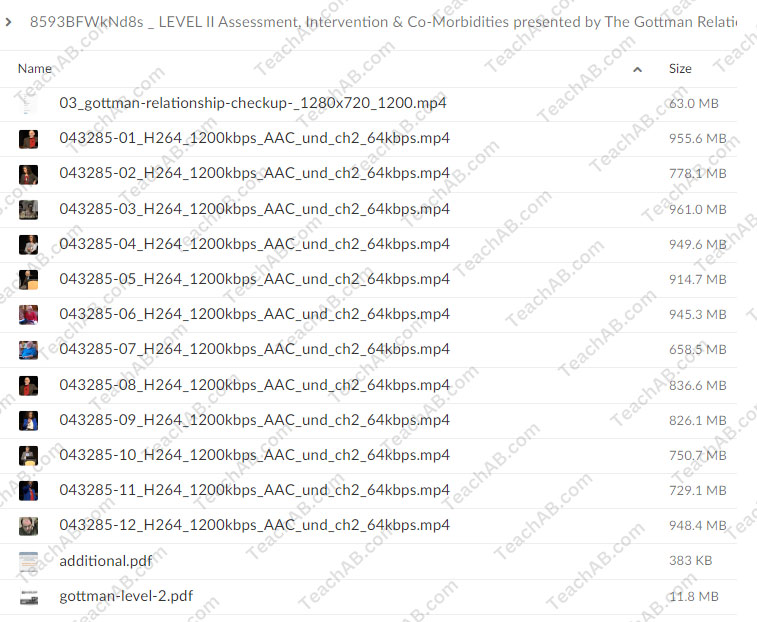-
×
 ALA Expert DIY 800 Club Credit Restoration Bundle By Myala - American Legacy Association
1 × $101.00
ALA Expert DIY 800 Club Credit Restoration Bundle By Myala - American Legacy Association
1 × $101.00 -
×
 SLAY Your Negotiation with a Narcissist in Business By Rebecca Zung
1 × $101.00
SLAY Your Negotiation with a Narcissist in Business By Rebecca Zung
1 × $101.00 -
×
 Super Grand Dance Combo By Paul Zaichik
1 × $101.00
Super Grand Dance Combo By Paul Zaichik
1 × $101.00 -
×
 Internal Power Package By Clear Martial Arts
1 × $101.00
Internal Power Package By Clear Martial Arts
1 × $101.00 -
×
 Why Men Lie, Why Women Lie - Audio Program By Alison Armstrong
1 × $23.00
Why Men Lie, Why Women Lie - Audio Program By Alison Armstrong
1 × $23.00 -
×
 Engaging the Rhythm of Regulation: Polyvagal Theory in Therapy By Rhythm of Regulation Online
1 × $101.00
Engaging the Rhythm of Regulation: Polyvagal Theory in Therapy By Rhythm of Regulation Online
1 × $101.00
LEVEL II: Assessment, Intervention & Co-Morbidities presented By The Gottman Relationship Institute
$550.00 Original price was: $550.00.$53.90Current price is: $53.90.
File size: 10.09 GB
Delivery time: 1-12 Hours
Media Type: Online Course
Content proof: Watch here!
Kích thước tệp: 10,09 GB
Review Level II: Assessment, Intervention, and Co-Morbidities Presented by The Gottman Relationship Institute – Immediate Download!
Let See The Content Inside This Course:

Description:
The Gottman Institute’s Level II Training: Assessment, Intervention, and Co-Morbidities is a significant step forward for couples therapy practitioners. This extensive three-day course equips clinicians to improve their assessment and intervention strategies by building on the fundamental skills they learned in Level I. Participants can greatly improve their therapeutic approaches and help their clients have healthier relationships by delving deeply into the complexities of pair dynamics.
By emphasizing emotional cues and physiological reactions during therapy sessions, this program provides crucial insights into the complexity of relationship health. In order to properly handle even the most difficult relational dynamics, participants are encouraged to actively engage with interdisciplinary approaches in couple therapy.

In-Depth Assessment Skills
One of the core components of the Level II training is the development of in-depth assessment skills. Participants will be trained to evaluate a couple’s “friendship profile,” “conflict profile,” and “shared meaning profile.” This comprehensive assessment is crucial for crafting tailored interventions, taking into account the unique dynamics that each couple presents.
- Friendship Profile: Understanding how couples interact positively is essential for therapy. The assessment sheds light on emotional connections and support, which are vital for maintaining a healthy relationship.
- Conflict Profile: Identifying patterns in how couples argue allows therapists to intervene more effectively. This profile helps in recognizing the underlying issues that fuel conflicts, paving the way for productive conversations.
- Shared Meaning Profile: This involves understanding the couple’s shared goals, dreams, and values. A solid grasp of their shared meaning enhances their bond, making it a critical focus during therapy.
These assessment tools enable clinicians to distinguish the varying emotional climates within couples’ interactions. By utilizing the Gottman Method’s assessment strategies, therapists are not just identifying problems; they are equipping themselves with a comprehensive understanding of each couple’s relational landscape, essential for informed intervention.
Evidence-Based Interventions
The training places significant emphasis on evidence-based interventions designed to combat the “Four Horsemen” of relationship breakdowns criticism, contempt, defensiveness, and stonewalling. Participants will not only learn about these destructive behaviors but will distinctly practice intervention techniques to counteract them.
- Criticism: Reframing criticisms into constructive feedback is essential in nurturing a positive communication atmosphere.
- Contempt: Addressing contempt head-on involves recognizing and rejecting negative attributions. Techniques such as expressing appreciation and respect can significantly mitigate contemptuous interactions.
- Defensiveness: Recognizing defensiveness as a protection mechanism and developing skills to own up to one’s contributions can lead to better resolution approaches in conflicts.
- Stonewalling: Learning how to recognize and deal with stonewalling is crucial. Therapists can guide couples toward reconnecting emotionally and learning to engage even during heightened tension.
Through practical role-play scenarios, participants will gain the confidence necessary to implement these interventions effectively. This hands-on approach not only instills a sense of competence but also allows for immediate feedback and growth, cultivating a deeper understanding of the Gottman Method’s principles.
Addressing Co-Morbidities
A significant aspect of the Level II training is the focus on addressing co-morbidities such as PTSD, addiction, and depression, which can complicate relationship dynamics and the efficacy of therapeutic practices. It’s essential for clinicians to recognize these overlapping issues and understand their impact on relationship health.
- PTSD: Trauma can severely affect communication and emotional safety. Knowing how to create a supportive environment for trauma recovery while addressing relationship concerns is crucial.
- Addiction: Couples dealing with substance use issues face unique challenges. Training helps clinicians develop skills for facilitating conversations about addiction that are compassionate yet assertive.
- Depression: Understanding how depression affects not just the individual but also their partner and the overall relationship dynamic is vital. Interventions can focus on enhancing support and understanding between partners.
Incorporating knowledge of co-morbidities prepares clinicians to explore these layers of complexity in therapy. The training provides valuable insights on when to refer clients for additional support, ensuring a well-rounded therapeutic approach.
Hands-On Learning
The hands-on learning component of Level II training enriches the educational experience through live demonstrations, original videos from the Gottman “Love Lab,” and interactive discussions. By integrating various learning modalities, this training ensures a well-rounded comprehension of the methodologies and principles behind the Gottman Method.
- Live Demonstrations: Witnessing real-life therapy sessions informs therapists about the nuances of interactions within couples, offering a practical perspective that theoretical learning alone cannot provide.
- Original Videos: Engaging with actual footage allows participants to analyze dynamics in a structured manner, enhancing observational skills critical for effective therapy.
- Interactive Discussions: These forums foster peer feedback, allowing participants to share insights and problem-solve together. This environment nurtures community, helping therapists feel less isolated in their practice.
Through these interactive elements, participants not only learn theory but also gain practical insights that can be immediately applied in their practice. This immersive learning experience significantly enhances comprehension, retention, and overall skill development.
Certification Opportunities
A certificate of completion is given to those who successfully complete Level II training. They can proceed toward becoming a certified Gottman therapist by completing Level III training after obtaining a minimum assessment score of 80%.
This accreditation attests to the clinician’s dedication to successful, evidence-based relationship therapy and marks an important turning point in their professional development. Professionals can draw in more clients and promote healthier interpersonal dynamics in their practice by gaining greater respect as trained Gottman therapists.
To sum up, The Gottman Institute’s Level II program offers practitioners a significant chance to expand their knowledge in couples therapy. Therapists can confidently handle complicated couple dynamics by emphasizing evidence-based therapies, thorough evaluation techniques, and the possible effects of co-morbidities. Together with certification pathways, the experiential learning approach guarantees that professionals have the know-how to help their clients develop healthy relationships. Participating in this course is an important step towards resolving the complex issues couples confront today, as the need for qualified relationship therapists keeps increasing.
Frequently Requested Enquiries:
Innovation in Business Models: We employ a group buying strategy that allows customers to divide costs and receive a lower rate for popular courses. Despite content providers’ concerns about distribution tactics, this approach benefits low-income individuals.
Legal Aspects: The legality of our conduct raises a number of complex issues. Although we do not have the course developer’s official permission to redistribute their content, there are no clear resale restrictions stated at the time of purchase. We have the opportunity to provide affordable educational resources because of this uncertainty.
Quality Control: We ensure that all of the course materials we purchase are identical to those supplied by the writers. However, it is important to understand that we are not approved vendors. Consequently, our products don’t include:
– In-person consultations or phone conversations with the course developer for advice.
– Access to sites or organizations that are exclusive to authors.
– Engaging in private forums.
– Simple email support from the author or their team.
By offering these courses independently, without the premium services of the official channels, we hope to reduce the barrier to education. We appreciate your understanding of our unique approach.
Be the first to review “LEVEL II: Assessment, Intervention & Co-Morbidities presented By The Gottman Relationship Institute” Cancel reply
You must be logged in to post a review.















Reviews
There are no reviews yet.